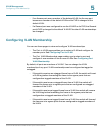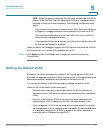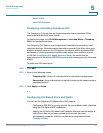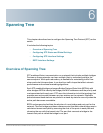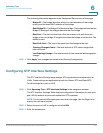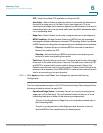
VLAN Management
Voice and Media
Cisco Small Business SG200 Series 8-port Smart Switch 115
5
STEP 1 Click VLAN Management > Voice and Media > SIP/H323 Based in the navigation
window.
The table lists the administrative and operational statuses for SIP/H323 Auto VoIP
on each interface, and shows the class that traffic will be assigned to. The traffic
class corresponding to the highest priority queue on the port is chosen
automatically.
STEP 2 Use the Interface Type menu to display ports or LAGs in the SIP/H323 Based
Interface Settings Table.
STEP 3 Select the port or LAG interface to configure and click Edit.
STEP 4 Select Enable for the Auto VoIP Mode.
STEP 5 Click Apply and then click Close. Your changes are saved to the Running
Configuration.
Media VLAN
The Media VLAN feature enables switch ports to carry voice, video, and signaling
traffic with an assigned priority value. Assigning different priorities to traffic
enables separation of media and data traffic coming into a port. The Media VLAN
feature helps to ensure that the sound or video quality of an IP phone or video
device is safeguarded from deterioration when data traffic on the port is high.
The inherent traffic isolation provided by VLANs ensures that inter-VLAN traffic is
under management control and that network-attached clients cannot initiate a
direct attack on voice components. The switch uses the IP-DSCP or 802.1p value
in packets from media devices to assign this traffic to high priority queues.
The switch uses Media VLANs to support LLDP-MED applications. (See LLDP-
MED for information on the protocol.) Each Media VLAN corresponds to an LLDP-
MED application for a specific type of media traffic. The LLDP-MED applications
are voice, voice signaling, guest voice, guest voice signaling, softphone voice,
video conferencing, streaming video, and video signaling. Each Media VLAN is
associated with the following parameters
• A VLAN with optional VLAN tagging
• An IEEE 802.1p priority value
• A DSCP value




